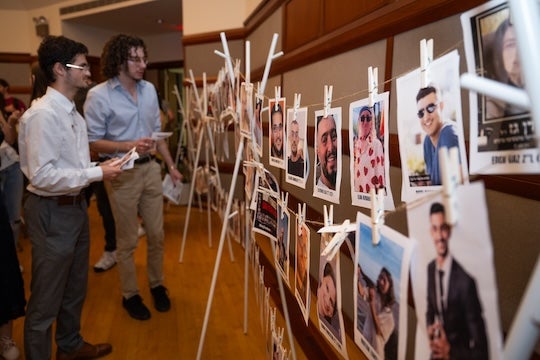One year after the Oct. 7, 2023, massacre in Israel, Chabad at Rice University honored the victims with scripture, songs and stories of survival at a vigil in Rice’s Farnsworth Pavilion.

Rice senior Perry Gilberd, president of Chabad, expressed gratitude to the attendees — students and university administration alike — who filled the hall in a powerful display of support.
“I stand here tonight, as I did last year, wearing my Star of David proud, because our stories matter,” Gilberd said. “Our identities matter, and no matter how uncomfortable the world may make us feel, we must continue to share them this evening. As we gather to honor the memories of those lost and listen to the stories of our guests, I am reminded that our resilience, both as individuals and the community, are our greatest strength.”
Rabbi Shmuli Slonim, who heads Rice Chabad with his wife, Nechama, said, “There’s nothing more that we all need today than coming together as a community.” He spoke poignantly of the tragedy last year, the ongoing attacks on Israel and said, “So many families are not whole that forever will be broken from that day.”

“Today is the date that will forever be etched in our hearts as a day of shock and pain,” he said. “So tonight, we’ll remember and mourn. Tonight we’ll pray in unity, and tonight, we’ll resolve for the future.”
Matan Gendelman, a Rice graduate student from Israel, lit a memorial candle to commemorate the victims. Rice seniors Gal Kadmon, who is from Israel, and Rachel Rosenthal read a passage from Psalms in Hebrew and English. Yasha Zemel, also an international student from Israel, offered moving remembrances of two friends lost Oct. 7, speaking of their “commitment to joy in life.”
“I think by learning about my two friends, you can see how all the people in Israel are so joyful, so committed to life,” Zemel said. “And I think the best way for us to remember them is to have that same commitment.”

Slonim introduced Liron Rokah and Zohar Arad, two survivors of the Oct. 7 attack by Hamas that killed more than 1,200 Israeli citizens. They were at the Nova Music Festival during the attack and flew from Israel to share their story.
“I cannot imagine what it takes to relive the horror and trauma from that fateful day one year ago. We very much appreciate your courage and strength to be joining us here tonight,” Slonim said.
Rokah and Arad, who are engaged to be married next year, spoke of their relationship, life in Israel and love of trance music, which ultimately led them to the festival that day.
Arad described Israel as a “very small country,” where trance music enthusiasts share a tight-knit bond. She recounted how the day began with her and Rokah gathering with friends in anticipation of the festival, which commenced with a breathtaking sunrise. In that moment, she thought to herself, “What an amazing day.”
Sadly, the joy of the day quickly turned to horror as the attack began.

“I told Liron, ‘Take us home now,’” Arad said.
At that moment, they had no idea that Hamas militants had infiltrated the festival, attacking and abducting attendees. When festival security alerted them, Rokah and Arad initially dismissed it as a miscommunication but soon found themselves under fire. They narrowly escaped to a nearby kibbutz, where they sheltered for over 12 hours, warning residents about the ongoing assaults. Both Rokah and Arad watched the day’s horrors unfold on social media, and Arad vividly recalled telling Rokah that she would rather die than face kidnapping and torture.
“I told her it’s okay, don’t be afraid, we’ll get back home today, don’t worry,” Rokah said. “But in my head, I understood that a situation like this could happen.”
The following day, the couple, who are both reservists with the Israel Defense Forces, reported for duty. National military service is mandatory for all Israeli citizens over the age of 18.

Despite the horrors faced Oct. 7, they said there was never any question in their minds about joining the defense of their country. Rokah said it helped him in the healing process.
Both Rokah and Arad reflected on the challenges of the past year, recognizing the vital role of therapy and open conversation in processing their experiences. They have also forged strong connections with fellow survivors from the festival, finding solace in their shared journey.
“One thing that we want you to take from our lecture is that our success [in recovering from the tragedy] begins with the small victories. Every step as we find a way to go to work, to go out with friends, to go to the therapist — they are steps for success as we find victory over this trauma,” Rokah said.
The event concluded with Slonim encouraging attendees to perform good deeds or “mitzvahs” in honor of those who were murdered that day. At the back of Farnsworth Pavilion, a display featured photos of individuals who lost their lives. Attendees were invited to take a photo card and commit to perform a mitzvah in their memory.
“In our [Jewish] tradition, the soul lives on. It relies on its friends and families down below to keep its spirit alive,” Slonim said. “We do that through doing a mitzvah, a good deed, in the memory of our lost ones.”

Slonim also thanked the Rice administration and police department for their support over the past year.
“We thank them very much for their commitment not only to our physical safety but our emotional, mental and spiritual safety too — to be able to be proud Jews on campus without the fear of what other students may say or what other student groups may do,” he said. “We are an unbreakable people who have been through so much suffering throughout history, but yet we are still here.”
For more information on Chabad at Rice, visit https://www.jewishriceu.com.

